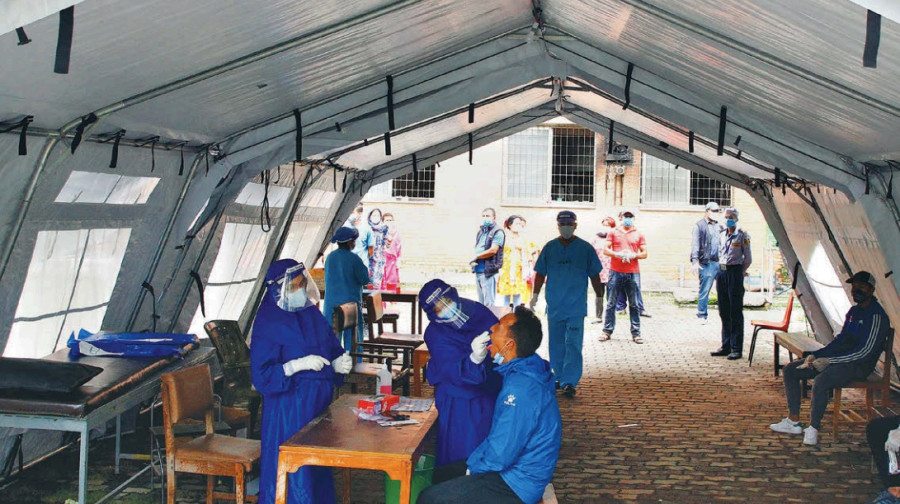Health
Take infected areas as clusters, restrict movement and speed up tests, say experts
Doctors say that contact tracing and tests will be ineffective if Covid-19 spills over to the wider community.
Arjun Poudel
Kathmandu Valley reported 572 new cases of Covid-19 infection on Thursday, the highest single-day spike in cases so far in the Valley.
Of the 1,246 new cases reported in the last 24 hours throughout the country, 46 percent have been reported only in the capital on the first day after the relaxation of the prohibitory order.
Public health experts say that the spike in new cases in the Valley is alarming, and it has been proven that the decision to relax restrictions wasn’t based on science. They warned that the infection will spread to the wider community if authorities concerned only resort to restrictions to contain coronavirus.
“We are tired of urging authorities concerned to plug the loopholes to put brakes on the growth of cases,” Dr Prabhat Adhikari, an infectious disease expert, told the Post. “Areas with positive cases should be taken as infection clusters and people there should be tested to prevent the infection from spilling over to the wider community. Restrictions should be enforced in areas which have more positive cases compared to others. ”
Authorities on Wednesday evening decided to continue prohibitory orders in the Valley for another week, with some relaxations. Doctors questioned the ad-hoc decision to lift the restrictions at once in all locations of the Valley.
They said that areas having more positive cases should be contained and restrictions should be lifted in the areas that have only a few cases.
Doctors say that seroprevalence surveys will be instrumental to assess where the clusters are. The Ministry of Health and population has decided to perform a seroprevalence survey months ago, but has not started it yet.
According to Dr Adhikari, even local health facilities can perform sero prevalence tests. For the study, they have to collect blood samples and submit it in to a laboratory.
“Cluster cases can even be identified by focusing on the address of the infected people,” said Adhikari. “Targeted polymerase chain reaction tests and pool tests can be done in areas with more cluster cases. If we can’t perform tests, such areas should be locked for two weeks to prevent the spread of the infection.”
As of Thursday, 50,465 persons have been infected with coronavirus across the country. Of them 32,471 got infected after the lockdown was lifted. Among them 9,630 got infected after the end of lockdown in the Kathmandu Valley.
Public health experts have been stressing proper planning to boost testing capacity, set up isolation facilities, control the spread of infection, and effectively trace the contacts of the infected .
Dr Anup Subedee, infectious disease expert, said that authorities should work seriously to use the window of opportunity to slow down the spread of the infection.
“We still have a window of opportunity to slow down the infection rate to a level that can be handled by our health facilities,” Subedee told the Post. “Increments in tests and contact tracing will have little impact if we fail to contain the widespread infection in the communities.”
Doctors have been saying that the number of tests should be increased, and results provided at the earliest to slow down the infection rate. Similarly, they have been calling on officials to enforce strict infection-control mechanisms at health facilities to save health workers and others from getting infected. Concerned authorities however, have not been paying heed to any of the recommendations.
“The government might have relaxed the restrictions after doing some preparations to handle the possible influx in the new cases,” Dr Sameer Kumar Adhikari, joint spokesperson for the Ministry of Health, told the Post.




 9.83°C Kathmandu
9.83°C Kathmandu















